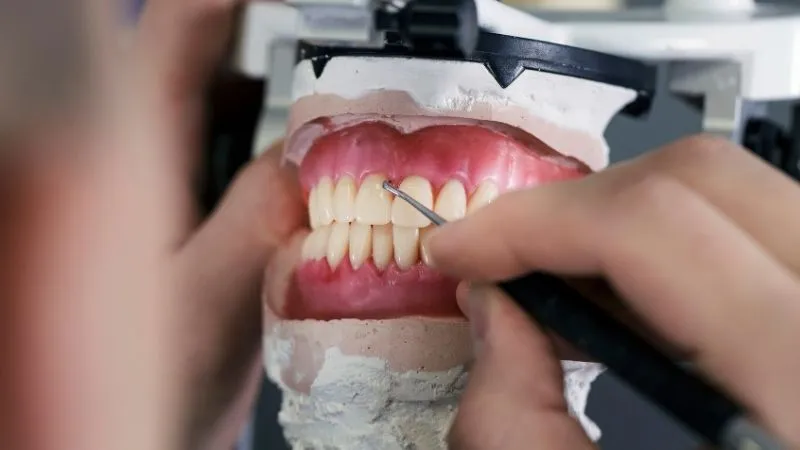What Is The Best Material For All on 4 Implants?
Imagine getting a brand-new, full set of teeth that feel secure-almost like your natural ones. That's precisely what All on 4 system offers. Instead of replacing each missing tooth with a separate implant, this technique uses just four strategically placed implants to support an entire arch of teeth.
Thanks to strong materials and strategic placement, a set of teeth is placed on only 4 implants: two implants are placed straight in front, while the two posterior implants are placed at an angle. This clever design spreads the chewing pressure evenly, making the system very stable and durable.
In addition, the materials used in implants and replacement teeth play a major role in strength, comfort and long-term success. Let's take a closer look at what makes these materials so special.

Understanding the Structural Components
All-on-4 dental implants Turkey system is designed to replace a full set of teeth using a few key structural components that work together for stability and function. Here's a breakdown of the main parts of these structural components:
Implants
Two materials are mainly used in dental implants. Titanium, which is often favoured, has exceptional compatibility and flexibility and fuses seamlessly with the jawbone for a 98% success rate. A newer ceramic, zirconia, offers a metal-free, aesthetically pleasing alternative and is ideal for allergy-prone individuals. To a lesser extent, improved titanium blends and alternative ceramics are available. The choice depends on individual needs, budget, allergy considerations, implant location and desired cosmetic results. Titanium has been reliably favoured for many years, but zirconium is also preferred due to patient need.
Abutments
These small fittings are attached to implants and hold the prosthetic teeth in place. Multi-unit abutments are used to accommodate angled implants and ensure a secure fit.
Abutments spread the pressure to protect implant and jawbone by bearing the load of chewing forces. By preventing bacterial build-up, they protect healthy gum tissue and minimise the risk of infection. Protects implant and bone, ensuring the longevity of implant. Periodic dental examinations are essential to maintain the optimum performance of All on 4 Turkey.
Abutments use a variety of materials tailored to specific needs. Titanium, recognised for its compatibility and durability, is the industry leader. Stainless steel abutments are also used, but are less common. The choice of material depends on implant placement, desired aesthetics and bite forces.
Prosthetic teeth
The replacement teeth, sitting on top of the abutment, are often made from durable acrylic with an internal titanium bar for extra strength.
Dental caps, known as crowns, are tailored covers for single teeth or implant posts. They serve to reinforce fractured or feeble teeth, shield teeth post-root canal, enhance teeth with aesthetic flaws, or anchor dental bridges. Unlike full or partial dentures that replace numerous or all teeth, crowns are individual, permanent fixtures. Their primary role is tooth preservation and restoration, whereas other prosthetics aim to fill gaps created by tooth loss.
While crowns are indeed a type of dental prosthesis, they represent just one category within the broader field of prosthetic dentistry. The term "prosthetic teeth" encompasses a wider range of dental solutions, including but not limited to crowns.
Attachment mechanism
The prosthetic teeth are securely fixed to the abutments with screws, creating a stable and permanent solution.
One major advantage of the All-on-4 system is that it allows for immediate loading, meaning patients can often receive a temporary set of fixed teeth on the same day as implant procedure. This method efficiently uses existing bone and provides both functional and aesthetic benefits.
Contact us today to get your All on 4 dental implants treatment at Rengarenk Dental Clinic Turkey, shine with your new smile without waiting in line!
Acrylic
Dental restorations, especially "All-on-4" sets, frequently employ acrylic, a plastic-like resin. This substance is favored for its lightness, adaptability, and compatibility with living tissue. In "All-on-4" cases, acrylic teeth are secured to titanium anchors implanted in the jaw. Its affordability, customizability, and natural appearance are key advantages. While less enduring than porcelain or zirconia, acrylic offers comfortable, stain-resistant, and bacteria-resistant replacements.
Patient satisfaction and long-term success rates are so good, making it a prevalent and practical option for full-arch dental solutions
Porcelain
Dental replacements often utilize porcelain, a ceramic valued for its lifelike resemblance to natural teeth and robust strength. This material is a favoured option for All-on-4 due to its enduring qualities and aesthetic appeal. However, porcelain tends to be pricier than acrylic and demands meticulous fitting, potentially involving intricate procedures. Though strong, it can be more prone to fracturing, which could impact jaw and gum health. Highly biocompatible, porcelain minimizes the risk of allergic reactions or irritation. The material maintains its colour over time, resisting stains from food and drinks. Compared to acrylic, porcelain is generally preferred for its superior durability, natural feel, and extended lifespan.
Ultimately, the choice between porcelain and other materials should be determined through professional dental consultation, considering individual requirements, budgetary considerations, and long-term objectives.
Nanoceramic
Modern All-on-4 setups utilize nanoceramics, a cutting-edge blend of glass and polymers. Engineered at a microscopic level, these materials offer a unique mix of strength and bendability, mirroring natural teeth. This flexibility enhances comfort and lessens implant strain. Nanoceramics enable easy customisation, both pre- and post-installation, and bond well with resins for simple adjustments. In All-on-4 cases, they provide immediate function and aesthetic improvements, withstanding significant chewing forces. These restorations boast a lifespan of more than ten years, signifying a notable leap in dental technology, delivering durable, natural-feeling full-mouth restorations.
Advantages of nanoceramics in All-on-4
- Nanoceramics closely resemble real teeth, providing a realistic and aesthetically pleasing smile.
- These prosthetics are highly durable, ensuring long-term function and reliability.
- The material absorbs impact like natural teeth, preventing the loud clacking sounds that can occur with other materials.
- Built on unique frameworks, nanoceramic bridges are lighter than metal-based alternatives, reducing strain on the implants.
- Nanoceramics integrate well with oral tissues, lowering the risk of irritation or allergic reactions.
- The material maintains its colour over time, allowing patients to enjoy food and drinks without discolouration concerns.
Zirconia
Dental replacements, including All-on-4 systems, increasingly favour zirconia, a robust ceramic. Known for its compatibility with living tissue and aesthetic appeal, zirconia provides exceptional strength and resilience. In All-on-4 applications, zirconia bridges deliver a natural-looking smile due to their lifelike translucency. These bridges offer longevity, resisting stains and providing comfort through precise, computer-aided design. Their non-porous surface also simplifies cleaning and hinders bacterial growth. Though initially pricier than acrylic, the enduring benefits of zirconia, particularly for permanent restorations, often justify the investment for both patients and dental professionals.
Advantages of zirconia in All-on-4
- Zirconia's white colour closely resembles natural teeth, creating a seamless and aesthetically pleasing smile.
- Highly durable and resistant to chipping, zirconia implants can last for many years without visible wear.
- A great option for patients with metal allergies or sensitivities, ensuring safe use.
- Zirconia collects less plaque and tartar, potentially lowering the risk of gum infections around the implants.
- Research suggests zirconia implants integrate as well as, or even better than, titanium implants for long-term stability.
Crystal ultra
Crystal Ultra, a hybrid nanoceramic, is gaining traction for All-on-4 implants.
This material merges glass with advanced polymers, achieving exceptional strength and flexibility. It's six times stronger than acrylic, yet bends under pressure, and is significantly lighter than zirconia. Its lifelike clarity replicates natural teeth. Compared to zirconia, it's quieter and easier to adjust; versus acrylic, it's more durable and aesthetically pleasing. In All-on-4, it's used for prosthetic teeth, with rapid manufacturing possible. Though its lifespan is 5-10 years, Crystal Ultra offers a compelling blend of strength, aesthetics, and user-friendliness, providing patients with comfortable, natural-looking implant solutions.
Advantages of crystal ultra in All-on-4
- Absorbs shock like real teeth, reducing stress on implants and enhancing comfort.
- Highly resistant to chipping and cracking, ensuring long-term reliability.
- Properly polished and sealed Crystal Ultra remains unaffected by liquids and discolouration.
- Its low weight and flexibility improve overall patient comfort.
- Can be quickly modified or repaired chairside, making adjustments convenient.
PEEK
PEEK (polyetheretherketone), a modern, robust plastic, is increasingly used in dental implants, including All-on-4 systems. It has high strength, low weight and bone-like flexibility, reducing stress on surrounding tissues. Lighter than titanium or zirconia, offering patient comfort. Studies show PEEK matches zirconia in survival, gum health, and bone preservation. It's quieter than zirconia and more durable than acrylic. A great option for those with metal allergies or sensitivities. Can be digitally designed for an accurate fit and improved functionality.
While potentially pricier, PEEK's properties make it a promising choice for natural-feeling, comfortable All-on-4 replacements.
Which is the Best?
There is no single "best" material for All-on-4 implants—each has its own benefits depending on the patient's needs. The ideal option depends on individual patient needs and details. However, we can compare the materials based on these key factors:
Factors that may influence your choice
Durability: Zirconia and titanium are the strongest options, with zirconia lasting over 10-15 years with proper care.
Aesthetic Appeal: Zirconia and Crystal Ultra closely resemble natural teeth for a lifelike smile.
Biocompatibility: Titanium, zirconia, and PEEK are safe and well-tolerated by the body, with titanium having a long history of success.
Comfort: PEEK and Crystal Ultra are lightweight and absorb shock, making them feel more like natural teeth.
Cost: Acrylic is the most budget-friendly option, while PEEK and Crystal Ultra are on the higher end.
Strength: Titanium and zirconia provide exceptional durability for long-term use.
Ease of Repair: Acrylic and PEEK are simpler to adjust and repair compared to harder materials like zirconia.
Patient Considerations: Factors like health conditions, allergies, and lifestyle can influence the best choice.
To determine the best material for you, we recommend reaching out to our clinic to discuss your specific needs.

